 By Ray Rivers By Ray Rivers
October 8th, 2019
BURLINGTON, ON
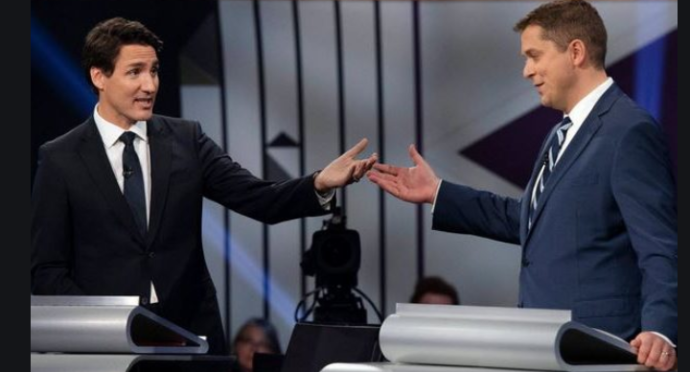 Just Trudeau and Andrew Scheer – they hammered away at each other. Neither managed to land a really hard punch. There were fleeting discussions around some issues, but all anyone will remember is the storm of insults hurled by adults acting like children.
And it all started with Andrew Scheer using his opening speech to level insults, and stunning hyperbole, at the prime minister.
“He puts on a middle-class mask and then raises taxes on middle-class Canadians. Mr. Trudeau you are a phony and you are a fraud and you do not deserve to govern this country….”
The concept of a single national leaders forum to discuss policy in both official languages is a worthy goal. But the proof is in the execution and there was so much wrong with this so-called debate. There was way too much on the program plate to being with. And when one tries to do everything one seldom does anything well.
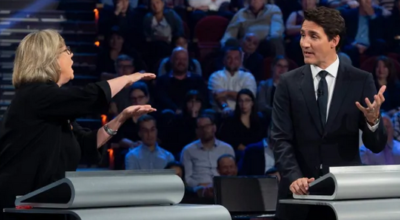 Elizabeth May, Green Party leader held her own – was it enough to advance their number of members in the House. For another thing there is no such thing as an ordinary undecided Canadian voter. And I’m getting really tired of seeing some random uninformed person pretending to represent me and asking a poorly constructed question to the leaders. That time would have been better utilized in the debate proper by the party leaders to actually explain their policies.
Then there were too many people involved for an effective debate. And while everyone wanted to be there, not everyone benefitted from that experience. Maxime Bernier, for example, might have stood a better chance of winning, at least his own seat, had he just stayed home. And what is a separatist party doing in a debate about national issues?
While the Greens, NDP, Bloc and the People’s Party all serve a useful function in our political system by bringing ideas to the table, there is no hope any of them will be forming government.
 Maxine Bernier on the left Yves-François Blanchet of the BLOC, center and Jagmeet Singh – they won’t form a government but they could determine who does govern. And how is it fair that a party without official party status, and currently holding only a couple seats, like the Greens, Peoples or BLOC, get equal debate time with the Liberals or CPC which hold the vast majority of seats and popular support? Shouldn’t they have just mailed in their questions instead?
But it was the negativity which almost sent me off to bed for an early night. Real debates are supposed to be beyond insults and slander. And Scheer wasn’t the only one trying to brand his main opponent, though he was the worst. That is after all, the sum total of how the Conservatives are running their campaign this year. Almost half of everything (47%) coming out of mouths of the Conservative Party of Canada (CPC) is negative and personal, and all of it aimed at Mr. Trudeau. And, despite Mr. Singh claiming the high moral ground, the NDP is almost as bad.
Oh sure, negative campaigns work. At least they did in the USA for Donald Trump, who falsely accused his opponent of being crooked, accompanied by a charming chant of ‘lock her up’. It was a lie but if you repeat a lie often enough people start to believe it. And though Trump lives in a glass house, none of the stones have ever bounced back to hit him – at least not yet.
And so it is with Mr. Scheer. He lied on his resume about being an insurance broker. He tried to hide his dual nationality. Doesn’t he break US law every time he crosses the border without his US passport? And he lies every time he talks about the federal carbon tax.
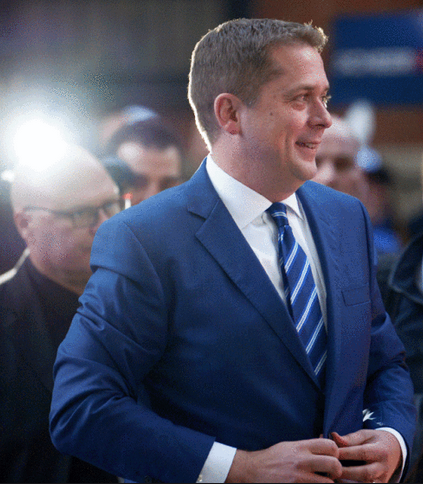 Andrew Scheer – he was better in the English language debate – French is not a language he is comfortable with. Scheer has never taken responsibility for his actions. Unlike Trudeau who recognizes his mistakes, Scheer never apologized for misleading people with his fake resume, not his previous stand on LGBT rights, nor holding back on his citizenship. And how ironic to label Trudeau with ‘not as advertised’ and ‘can’t be trusted’.
There are serious policy differences between the two leading political entities in this country. Let’s have a serious debate about the future of fossil fuels and whether we need more pipelines and petroleum resource development.
Let’s discuss the merits of doing more of what we have always done or taking more drastic climate action. Let us address the still growing wealth and income gaps in this country. Let us resolve the importance of balancing the budget versus borrowing for investment in our human and physical capital, and growing the economy.
Maxime Bernier has invited Canadians to have an adult discussion on immigration and our refugee policy. Elizabeth May has demanded that we ban the internal combustion engine by 2030. Jagmeet Singh would like Canada to reopen the constitution and find a new accommodation for Quebec.
Mr. Scheer has promised to bring back a partisan Senate and Mr. Singh’s party has long called for its abolition.
What about defence policy and Canada’s contribution as it applies to NATO spending targets? There is discussion of a wealth tax and of raising the capital gains tax to 100%. What about China?
This week’s debate may have been good entertainment, though for me it was depressing. Government should be about policy and not just theatre. It is unclear if any one of the six party leaders ‘won’ in the so-called debate, but we all lost an opportunity to be better informed on the issues before us and what these characters would really do if we elect them PM.
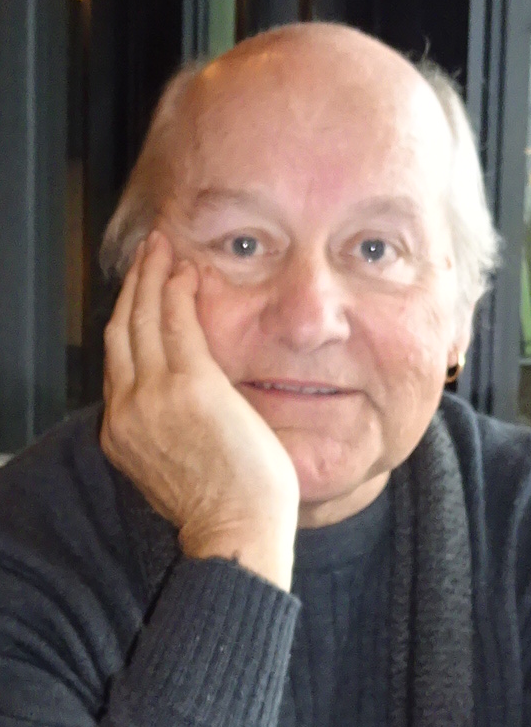 Ray Rivers writes regularly on both federal and provincial politics, applying his more than 25 years as a federal bureaucrat to his thinking. Rivers was once a candidate for provincial office in Burlington. He was the founder of the Burlington citizen committee on sustainability at a time when climate warming was a hotly debated subject. Ray has a post graduate degree in economics that he earned at the University of Ottawa. Tweet @rayzrivers Ray Rivers writes regularly on both federal and provincial politics, applying his more than 25 years as a federal bureaucrat to his thinking. Rivers was once a candidate for provincial office in Burlington. He was the founder of the Burlington citizen committee on sustainability at a time when climate warming was a hotly debated subject. Ray has a post graduate degree in economics that he earned at the University of Ottawa. Tweet @rayzrivers
Background links:
Five key moments
Two two mainline parties.
Where do they stand on taxes

 By Staff By Staff
October 8th, 2019
BURLINGTON, ON
If you’re driving on the major highways you know how many trucks there are on the road. And you have every right to wonder just how safe those trucks are – the Regional Police completed a Commercial Motor Vehicle Blitz.
Despite very poor weather conditions they inspected more than 300 commercial motor vehicles.
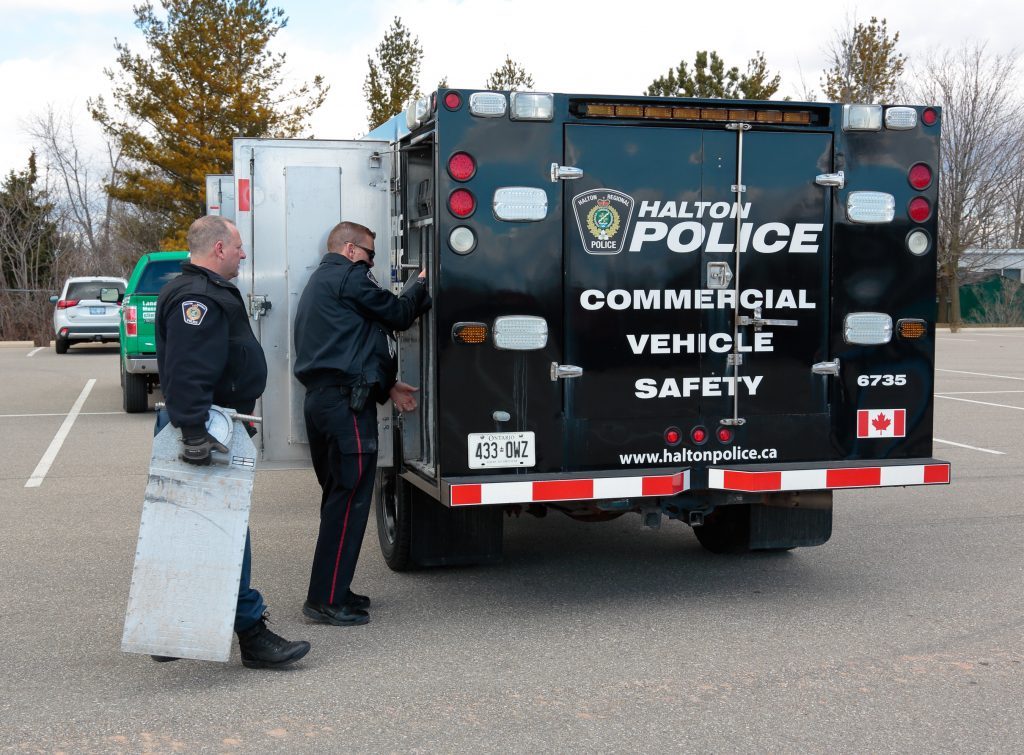 The police arrive well equipped to do through inspections. The two-day enforcement blitz, that involved officers and inspectors from the Halton Regional Police Service, along with assistance from neighbouring police services, the Ministry of Transportation and the Ministry of Finance/ Environment yielded the following results:
• Total commercial motor vehicles inspected: 308
• Total commercial motor vehicles taken out of service: 99 (33 percent failure rate)
• Total charges laid: 239
• Sets of licence plates seized by police: 11
2018 Results:
• Total commercial motor vehicles inspected: 443
• Total commercial motor vehicles taken out of service: 143 (32 percent failure rate)
• Total charges laid: 268
• Sets of licence plates seized by police: 13
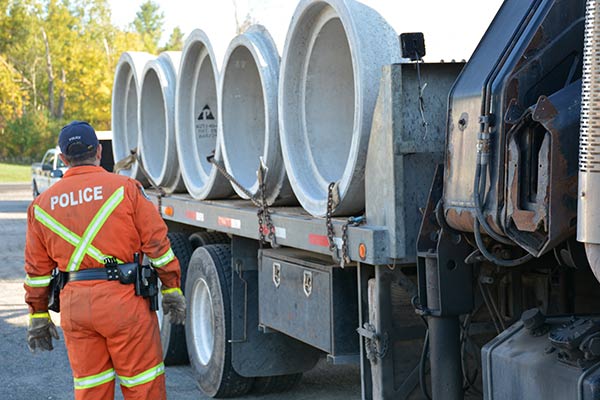 Is the load properly and safely secured? Top five charge categories laid during 2019 blitz:
• Failure to complete daily inspections
• Vehicle maintenance
• Failure to obtain annual inspection certificate
• Cargo securement
• Weight violations
New this year, officers also implemented impaired driver screening tests through the use of SFST (Standard Field Sobriety Testing), ASD (Approved Screening Device) for alcohol and ADSE (Approved Drug Screening Equipment) for drugs including THC and cocaine.
The blitz resulted in a total of 182 impaired driver screenings (83% of all heavy commercial motor vehicles drivers inspected during the blitz). These screenings showed a high level of compliance with 179 pass results (98%). The drivers who did not pass were given suspensions for being in violation of the zero alcohol or drug provisions for commercial motor vehicles under the Highway Traffic Act.
“1 in 3 trucks being removed from service as a result of our annual blitz says a few things. Credit to the trucking industry who make safety their priority – as many truck operators do recognize the thin margin for error that exists in operating complex trucks on our roadways. Mechanical fitness, load security and driver fitness are not an option – it’s an obligation.
 Tractor trailers get very close inspections. For those who don’t, Halton Police and our partners will continue to hold truck operators accountable to elevate safety for all road users. Safe trucks, safe loads and safe drivers benefit everyone” said Sgt. Ryan Snow, Traffic Services Unit.

 By Pepper Parr By Pepper Parr
October 7th, 2019
BURLINGTON, ON
The city is having the private tree by law debate – again.
We are in different times and different actions have to be taken.
Burlington declared a Climate Emergency – many many others have done the same thing. This city council wants to go a lot further than any past council in saving the trees and it is going to cost – quite a bit.
 This is what the urban canopy is all about. Lose it and the value of the houses on the street plummet. At the Burlington federal candidate debate Liberal Karina Gould said there was no problem with people agreeing that climate change was real – where we have the problems she said is their willingness to pay for the changes that are going to have to be made.
Council had four options in front of them: Here they are with the costs attached.
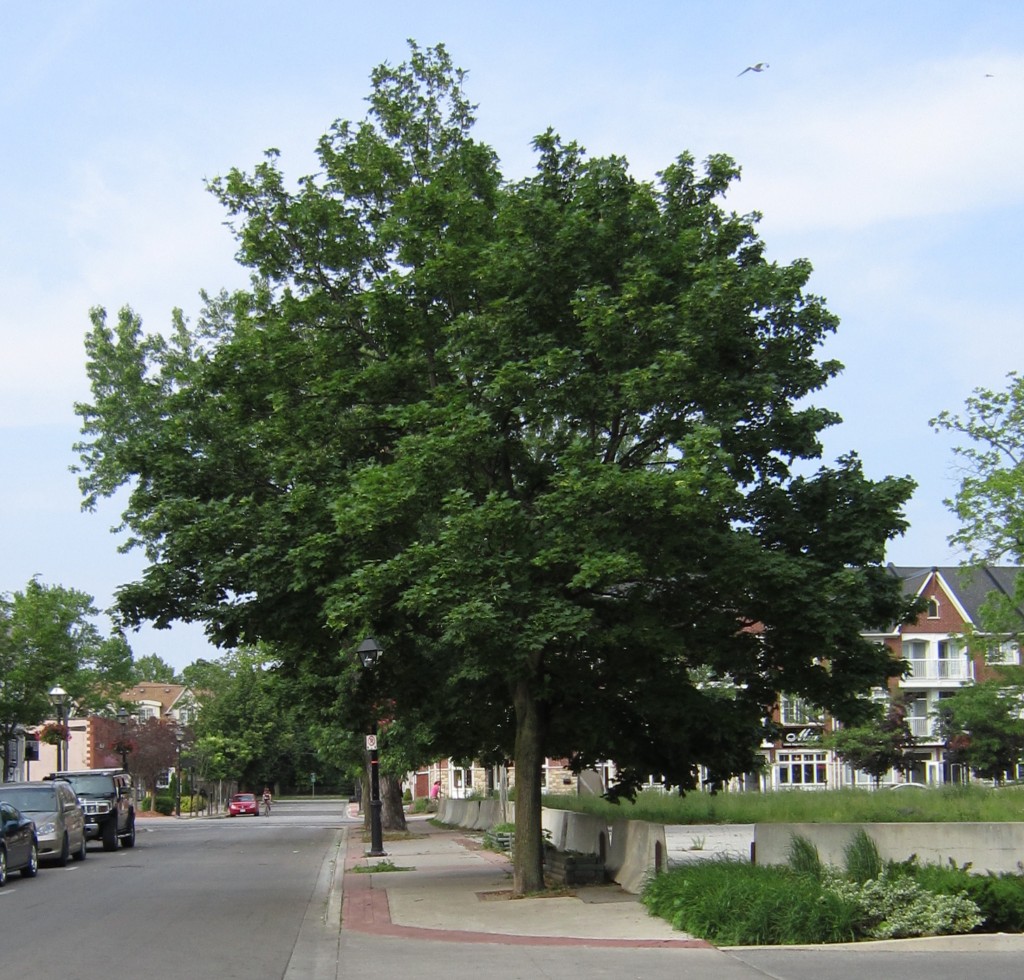 These trees were cut down to allow for the building of a retirement home on Pine Street. OPTION 1: Status quo
A status quo approach was considered as part of this report. This would allow the current Pilot Private Tree Bylaw in Roseland to run the original 2-
Pros: Allows for more time to evaluate the pilot.
Cons: This does not consider the implications of a declared climate emergency, and delays protection of trees citywide.
COST: Option 1 – no impact
OPTION 2: Expand the Bylaw to Ward 4 Only
The expansion of the bylaw to ward 4 was considered as part of this report. The staff requirement would be reduced to 1 full time staff, with associated cost reductions.
Pros: Provides for a slightly larger pilot area.
Cons: This does not consider the implications of a declared climate emergency, and delays protection of trees citywide.
COST: The operating budget impact is $95,000 for 1 full-time tree protection officer. The capital budget impact is $51,000 including the purchase of 1 electric vehicle and charging station.
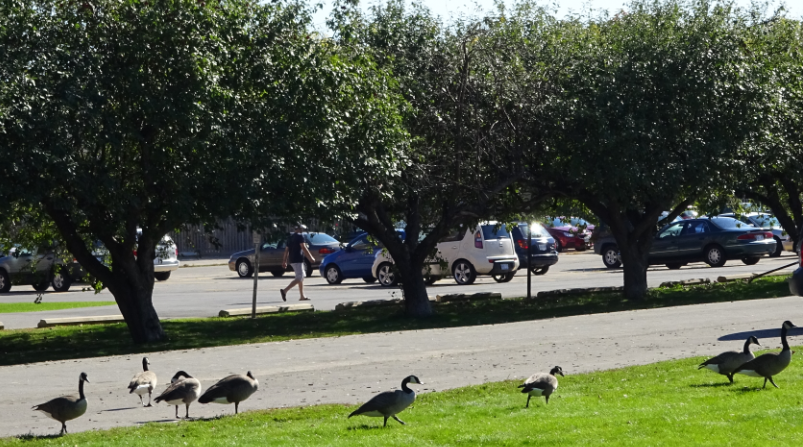 This group of trees beside a popular church on Guelph Line were cut down because the geese were eating the apples and pooping on the church drive way. OPTION 3: Repeal the Pilot Private Tree Bylaw and approve a bylaw for the urban area only
This option would protect all private trees within the urban area of the City and exclude all agricultural and rural areas north of Highway 5/407.
Pros: Provides protection for private trees in the most populated area of the City.
Cons: Does not provide protection for residential properties in the rural area that are not covered under the Regional bylaw for woodlots.
COST: Option 3 and 4 – The operating budget impact is $300,000.00 including 5 full- time staff (1 supervisor and 4 tree protection officer)
OPTION 4: Repeal the Pilot Private Tree Bylaw and approve a city-wide private tree bylaw
Pros: This option provides the highest level of protection by including the entire city.
Cons: Increased resource requirements in both operating and capital budgets.
The capital budget impact is $250,000 including the purchase of 5 electric vehicles and 2 charging stations to be installed at the City’s Operations Centre.
Source of Funding
The Private Tree Bylaw will be funded through both the operating and capital budget, and a business case has been prepared for consideration in the 2020 budget process. There will be partial cost recovery of administrative costs through permit fees, as well as bylaw contravention fees through site inspection, estimated at approximately $200,000.
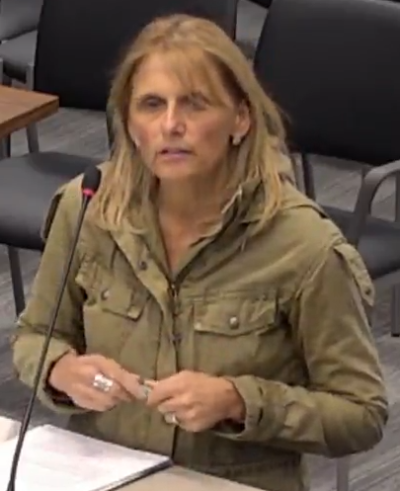 BurlingtonGreen Executive Director Amy Schnurr Contracted service costs are expected to decrease by $12,000 per year. The impact to the property tax rate is estimated at 0.18%.
In the ensuing debate we will see how our city Councillors handle the issue and what the public has to say.
There were two delegations to the meeting Monday evening; the Executive Directors of both Burlington Green and Oakville Green.
The report will come back to city council in December.

 By Pepper Parr By Pepper Parr
October 7th, 2019
BURLINGTON, ON
The Marsdens (Dave and Anne) were never in the business of making life easy for their elected officials.
It has cost them dearly. They have been treated with contempt, not permitted to talk to city staff and then barred from city hall as well as barred from Regional Council.
They are prickly.
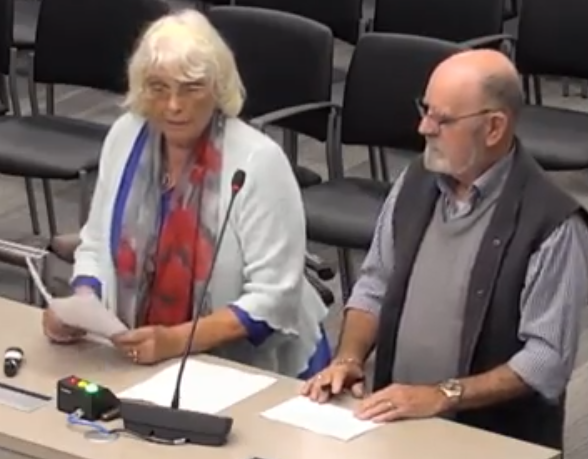 Anne and David Marsden – delegating at city council. They are now permitted to delegate at city hall; they appeared during the Provincial Review earlier this year at the Region.
This morning they were at the podium in Council Chambers pointing out an embarrassing situation.
The Agenda for the meeting this week had several problematic entries.
Several of the important items did not have a report attached which meant that anyone who wanted to know what the Agenda item was about was basically out of luck. All they had was a headline.
The Marsdens don’t take to that kind of behaviour and they stood at the podium and asked, first; why there were no reports attached to the Agenda item, and because one was of particular interest to them they wanted any discussion to be deferred to the November round of Standing Committee.
At one point it got rather testy when Ms Marsden made a statement that the chair wanted her to strike from the comments she had made.
That didn’t go down all that well with the Marsdens.
The issues for the Marsdens was that in order to delegate on a matter you had to register with the Clerk’s Office not later than the Friday before the scheduled meeting.
The following agenda items had no report attached to them.
Infrastructure Funding CM 22-18
Note: This item will be distributed under separate cover.
City Wide Private Tree bylaw Implementation RPF 15-19
Note: This item will be distributed under separate cover.
2020 Calendar of meetings for Council and Standing Committees. CL 16-19
Note: This item will be distributed under separate cover.
The private tree bylaw issue was extremely divisive; there were a lot of harsh words said at several of the meetings. How city hall thought they could actually get away with something like this is astounding.
Not sure which is worse – that it was deliberate or a stupid administrative error.
Without knowing much about the report that was going to be debated – the Marsdens didn’t feel they could delegate. They did manage to scoot down to city hall late on the Friday and get a copy of the report – which when they saw the details they were very certain that they would be delegating.
How do things like this happen? Who lets an Agenda like this get sent out? The city Clerk is responsible for the Agenda – but the city manager signs off on everything.
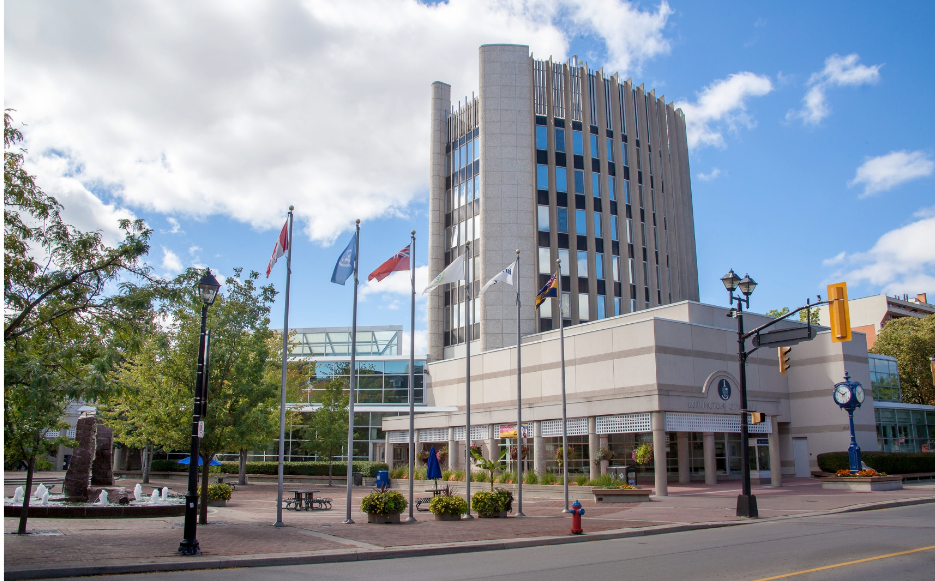 Is there something about his building that prevents the left hands of those who work there from knowing what the right hand is doing? There wasn’t much in the way of an explanation – other than a media release sent out by the city later in the day saying they were “Making it easier for residents to find information about development applications, construction and road restrictions.”
On a separate matter Heather MacDonald, Executive Director of Community Planning, Regulation and Mobility said: “We understand that at any given time, there can be a lot of activity happening in the city and it’s not always easy to know where to go to learn more information.”
Something isn’t right here.

 By Staff By Staff
October 7th, 2019
BURLINGTON, ON
More than 150 visitors came from across Halton Region to attend Nelson Aggregates’ Quarry Open House and Bus Tour.
Nelson President Quinn Moyer said: “We were pleasantly surprised. Attendees showed a lot of interest and support for our operations, our expansion plans and our vision for turning the site into a park over 30 years.”
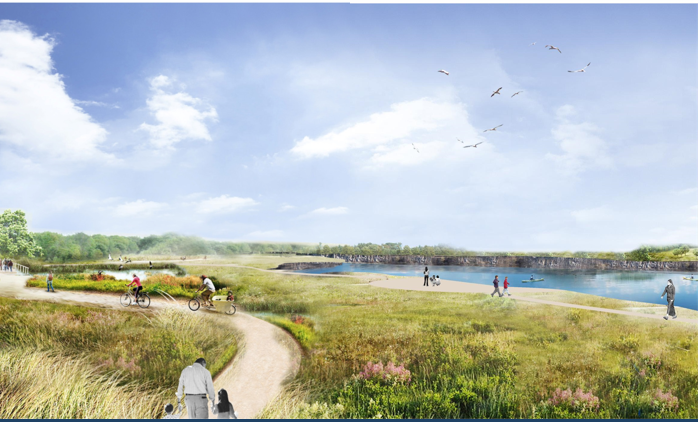 The golf club property that is on the western side of the properties would be turned into a very large park. The Open House featured bus tours of the quarry and interactive exhibits, including quarry machinery such as crushers, loaders, bulldozers and excavators.
“It’s great to see residents interested in the types of operations that form the foundation of our daily lives,” Moyer said. “It’s easy to forget that the building blocks of where we live come from quarries like ours.”
The Mt. Nemo quarry has played an important role as Burlington’s main source of limestone for more than 50 years. Its aggregate forms the foundation of most roads, buildings and infrastructure in Burlington.
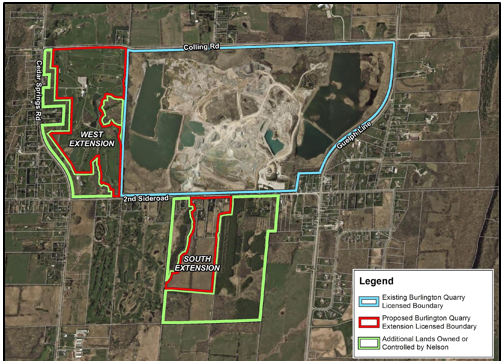 One quarry that is close to be mined out; two new quarries that would be open and then everything would be turned over to the public. A proposal is underway to expand the quarry over the next 30 years, and to donate the rehabilitated land in parcels over that time to form the largest park in Burlington.
The proposed park would be nearly six times larger than Burlington’s City View Park. The size and scale of the park would allow for abundant recreational opportunities, from biking and swimming to rock climbing and soccer.
 A lake – 77 acres in size will be formed out of a mined out quarry. The Gazette asked a reader to take the tour and come back to us with his views. He didn’t take out his wallet to buy into it – but did say that he wanted to hear more. “Was this a gift horse whose mouth we should be looking into” he asked “or is it a Trojan horse that we would regret letting in.”
The Nelson Aggregate people have yet to have a conversation with the ward Councillor, Rory Nisan, who has said he doesn’t want anyone to shape his opinion of the project, has shown no interest in hearing what the aggregate producer has in mind.
So far, the only Councillor who has been to the site is Angelo Bentivegna who was with our reader.
Our reader has said he is of two minds. The one thing he is certain about is that the city should be talking to the Nelson people and learning more about what they have in mind.
The Planning department, who have more on their plates than they can handle now, are certainly not out there looking for things to do.
Our reader said he was really impressed with the potential but did wonder if Burlington needed another park.
What our reader did find interesting was that no one he talked to came out and said they did not want a park in that part of Burlington.
With the public tour behind them Nelson now has to craft the application it has to take to the city and at the same time think through the various levels of government they are going to have to satisfy and how best they can do that.
The next step is to have a pre-consultation meeting with the Planning department – expected to be sometime in November.
The big picture question is: Is another park needed? Not today perhaps but in 30 years the need for public space will be a lot different than it is today.
To find out more CLICK HERE

 Blair Smith and Lynn Crosby Blair Smith and Lynn Crosby
October 7th, 2019
BURLINGTON, ON
“If you judge from appearances here,’ replied Madame de Chartres, ‘you will be often mistaken; what appears is seldom the truth.”
― Madame de La Fayette, The Princesse de Clèves
Or to paraphrase in modern idiom, “what you see may not be what you get.” Appearances are deceptive, particularly when there is an intent to mask what is planned.
For months now WeLoveBurlington has been warning the citizens of Burlington and Halton of the potential dangers of regional government amalgamation. We have talked about the possible MegaCity of Halton, the flawed process of the regional government review, the history of the reviewers, the comforting ‘party line’ assurances of our elected representatives and the broken consultation record of our current provincial government.
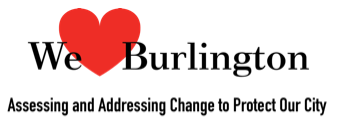 We have attempted to be fair, accurate and non-partisan. We have posted links to numerous articles, several by noted conservative analysts, that all have a common message – municipal amalgamation is seldom successful. Most frequently, it results in higher taxes, greater municipal debt, reduced services, increased cost of government and loss of local voice. We have attempted to be fair, accurate and non-partisan. We have posted links to numerous articles, several by noted conservative analysts, that all have a common message – municipal amalgamation is seldom successful. Most frequently, it results in higher taxes, greater municipal debt, reduced services, increased cost of government and loss of local voice.
One of our Burlington MPPs has claimed categorically that there will be no amalgamation of any of the municipalities in Halton; another Oakville MPP has cited MegaCity warnings as “false and misleading”. So, where does the truth fall? Let’s examine one possibility – that external appearances may remain much the same but the truth will be a dramatically restructured region under the covers.
Once “the report” is made public in late Fall/early Winter – and we see no reason why it shouldn’t be – what might it contain? Here is one of many possible scenarios. Perhaps the review will leave the existing Halton Council structures much the same – both in name and in number. Burlington, Oakville, Milton and Halton Hills will remain with their existing contingent of councilors and mayors. They will continue to hold meetings, set budgets (within certain parameters) and develop plans responding to constituent needs and operational priorities.
 Is this a case of – what you see is what you get – or are appearances really deceiving? In other words, the local identity will still be the local identity – at least in appearance. But will the program, policy and operational frameworks be the same? Suppose that instead of ‘amalgamation’ we have ‘consolidation’ using a model that is quite common and in extensive use within the provincial government; that of the “cluster” or centre-satellite.
Within this scenario policy, program development and administrative control are exercised at the “centre”; local service operations by the ‘municipality’. So, it is likely that all remaining emergency services (health, fire and police in total) will be consolidated at the regional level. So too will transit have a regional scope rather than local presence with much tighter integration with integrated ticketing (Presto farecard) and centralized scheduling/operations. Purchasing would be done regionally, using developed vendors-of-record or accessing provincial agreements and local fleet management would be a thing of the past.
Could there be economies of scale and efficiencies realized? Possibly, if done well but the increase in the regional bureaucracy will be extensive and the local municipalities will likely maintain much the same staffing. There will also be local Information technology, legal, finance, human resource and Clerk functions but they will report to senior portfolio executives on the Regional level and it will be the latter, sitting as an Executive Committee, who will set policy frameworks, strategic directions and operational program components. In fairness, there could still be benefits achieved that might mitigate the remove of local service provision to a more distant governance structure.
However, it becomes increasingly more problematic as more and more functions, thus power and control, are vested in the regional centre with probable loss of sensitivity to local service issues and environment.
The death knell of local voice, local expression and local direction would be the regional consolidation of municipal land planning, development and management functions. This is the prize that, arguably, is the animus behind the whole review exercise; the jewel teasingly revealed by tentative provincial forays into the protected green-belt and then openly burnished by Bill 108.
WeLoveBurlington has, from the onset, stressed the interconnection between the regional governance review, Bill 108 and the proposed restructuring of land development mediation/arbitration functions – from OMB to LPAT to RPAT?? Indeed, for at least eight years, Burlington has been caught in the vise-grip of provincial intensification targets, bureaucratic indifference, private sector self-interest and an arrogant, entitled Council. Much of the damage has unfortunately been done and is beyond recall but the people’s voice – clearly heard last October 22nd – needs to resonate again and loudly.
Is this outcome conjecture? Yes, but it’s also a reasoned and very possible direction. It would leave only the shell of local authority to mask a consolidated, centralized and distanced governance at the region, a MegaCity in everything but name. Whether ultimately fantasy or foresight, WeLoveBurlington will provide an unbiased and balanced assessment of the change. Even if it walks like a duck and quacks like a duck, we’ll still let citizens know if they’ve actually been given a turkey.
Question for Burlington Federal Candidates
We have submitted the following question to the candidates representing Burlington in the upcoming federal election. We will post any replies that we receive.
Recognizing that municipalities are the creatures of the provincial government and almost totally under provincial control, what could you do, as Burlington’s federal government representative, to ensure that the City retains a strong identity with a resonant local voice?
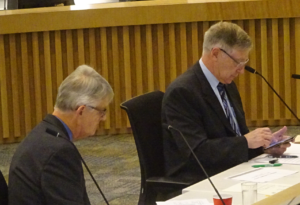 Michael Fenn and Robert Seiling did the Provincial Review; Fenn was once the city manager of Burlington. Regional Review Report Received by Minister
The CBC reported last week that the regional review report has been in Minister Steve Clark’s hands since September 20.
The article states: “Clark said he would take his time with the report before he presents the findings to his cabinet colleagues as “confidential advice” and before deciding whether to make the details public.
Related news stories.
Provincial Review: The issue
What the Lovelies had to say.

 By Ashley Worobec By Ashley Worobec
October 7th, 2019
BURLINGTON, ON
Overall it’s been another good week, however my right Achilles tendon started to give me some grief a few days ago. With long runs getting well up into the high-30+-kms, a few aches and pains here and there can sometimes be inevitable. Thankfully, I work in a sports clinic, so I got treatment right away (laser therapy is shown here) and it’s feeling much better.
 This is what laser therapy looks like. I had a drop-back weekend this weekend, so my run this morning was only 16km and I ran it completely pain-free.
Our peak run comes up this weekend- 38km on Thanksgiving Sunday morning, and you can be sure that I’ll take full advantage of that Thanksgiving dinner afterwards!
I am really happy with how September went, I was able to stay very consistent and run all 17 of my 17 scheduled runs. September was my peak month for mileage, and while I do have one more big week of training ahead of me, the majority of October is focused on tapering down the mileage and recovering to be ready for November 3rd.
 There was also a mix-in of gym workouts, weekly Pilates, and a couple of hot yoga classes. On the one hand, cross-training is still very important to keep me strong and not injured, however at this stage of marathon training, the cumulative effect of all the mileage becomes very real, and there’s a fine balance between doing too much and doing too little cross-training. There was also a mix-in of gym workouts, weekly Pilates, and a couple of hot yoga classes. On the one hand, cross-training is still very important to keep me strong and not injured, however at this stage of marathon training, the cumulative effect of all the mileage becomes very real, and there’s a fine balance between doing too much and doing too little cross-training.
I have been doing private Pilates classes once per week for the past few months, and I really think it’s helped me to stay strong and be able to handle this marathon build.
 Easing the tension on an ankle The Fall has brought darker mornings with it, and as I start most of my runs around 5:30am, my light-up vest has become a staple in my wardrobe. On my solo runs, I’m often listening to podcasts, and lately the topic has been, you guessed it, the New York City marathon. I’ve been listening to race reports and course previews, and I’m starting to get really excited about the magnitude of this experience.
More than 52,000 runners will be there (we’re sent to the start line in waves to minimize congestion) and more than 1 million spectators are said to line the route!

 By Pepper Parr By Pepper Parr
October 4, 2019
BURLINGTON, ON
If you spend any of your time on the kind of development that is taking place in Burlington, you will have heard about this matter before.
Every development application includes material on how the application complies with PPS 2014 – Provincial Policy Statement.
The document is part of the Planning act which governs everything that gets done when it comes to developments.
The PPS gets updated from time to time. That time is upon us now.
In a recent media release the province announced that it is open for feedback and comment from the public.
Here is what the provincial government wants to change in the PPS.
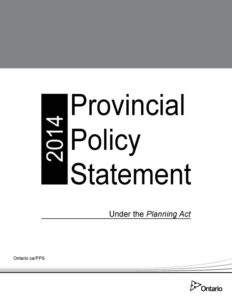 Increasing housing supply, supporting jobs and streamlining development approvals are top priorities for the government. The Action Plan includes a series of distinct but coordinated initiatives to address housing supply, including a review of the Provincial Policy Statement (PPS) – the foundation for land use planning in the province. Increasing housing supply, supporting jobs and streamlining development approvals are top priorities for the government. The Action Plan includes a series of distinct but coordinated initiatives to address housing supply, including a review of the Provincial Policy Statement (PPS) – the foundation for land use planning in the province.
The government is consulting on proposed changes to the Provincial Policy Statement to support the government’s Housing Supply Action Plan and other land use planning related priorities.
About the Provincial Policy Statement
The Provincial Policy Statement is a consolidated statement of the government’s policies on land use planning and is issued under section 3 of the Planning Act. It applies province-wide and sets out the provincial policy direction for:
The efficient use and management of land and infrastructure
Ensuring the provision of sufficient housing to meet changing needs, including affordable housing
Protecting the environment and resources including farmland, natural resources (e.g., wetlands and woodlands) and water
Ensuring opportunities for economic development and job creation
Ensuring the appropriate transportation, water, sewer and other infrastructure is available to accommodate current and future needs
Protecting people, property and community resources by directing development away from natural or human-made hazards – such as flood prone areas
The PPS is the primary provincial land use policy document guiding municipal decision-making. The Planning Act requires that decisions on land use planning matters be “consistent with” the PPS
Municipalities are the primary implementers of the PPS through policies in their local official plans, zoning by-laws and other planning related decisions.
Proposed Policy Changes
The government is proposing policy changes to:
Encourage the development of an increased mix and supply of housing
Protect the environment and public safety
Reduce barriers and costs for development and provide greater predictability
Support rural, northern and Indigenous communities
Support the economy and job creation
1. Increasing Housing Supply and Mix
The proposed draft policies for consultation would:
Increase land supply requirements municipalities must meet:
Increase planning horizon from 20 to 25 years
Increase housing land supply from 10 to 12 years
Allow higher minimum requirement for serviced residential land (5 years) for upper- and single-tier municipalities
Update provincial guidance to support land budgeting (i.e. Projection Methodology)
Increase flexibility for municipalities related to the phasing of development and compact form
Add flexibility to the process for settlement area boundary expansions (e.g. allow minor adjustments subject to specific tests, highlight that study requirements should be proportionate to the size/scale of development)
Require transit-supportive development and prioritize intensification, including potential air rights development, in proximity to transit, including corridors and stations
Support the development of housing to meet current and future housing needs, and add reference to housing options
Support municipalities in achieving affordable housing targets by requiring alignment with Housing and Homelessness Plans
Broaden PPS policies to enhance support for development of long-term care homes
2. Protecting the Environment and Public Safety
The proposed draft policies for consultation would:
Enhance direction to prepare for impacts of a changing climate
Enhance storm water management policies to protect water and support climate resiliency
Promote the on-site local reuse of excess soil
Maintain current policies related to natural and human made hazards which directs development away from hazardous areas including flood-prone areas in order to protect public health and safety, while work by the Special Advisor on Flooding is underway
Maintain current policies that require municipalities in southern Ontario to identify natural heritage systems, and provide flexibility as to how to achieve this outcome
Maintain protections for the Greenbelt
3. Reducing Barriers and Costs
The proposed draft policies for consultation would:
Require municipalities to take action to fast-track development applications for certain proposals (e.g. housing)
Allow mineral aggregate operations to use rehabilitation plans to demonstrate that extraction will have no negative impacts
Align policies and definition of cultural heritage with recent changes to the Ontario Heritage Act
Refocus PPS energy policies to support a broad range of energy types and opportunities for increased energy supply
Direct large ground-mounted solar facilities away from prime agricultural and specialty crop areas
Make minor changes to streamline development approvals and support burden reduction
4. Supporting Rural, Northern and Indigenous Communities
The proposed draft policies for consultation would:
Allow flexibility for communities by clarifying perceived barriers to sewage and water servicing policies for lot creation and development in rural settlement areas
Enhance municipal engagement with Indigenous communities on land use planning to help inform decision-making, build relationships and address issues upfront in the approvals process
Enhance agricultural protections to support critical food production and the agricultural sector as a significant economic driver
5. Supporting Certainty and Economic Growth
The proposed draft policies for consultation would:
Encourage municipalities to facilitate conditions for economic investment, and at the time of official plan review or update, assess locally-identified employment areas to ensure designations are appropriate
Provide municipalities with greater control over employment area conversions to support the forms of development and job creation that suit the local context (current and future)
Provide stronger protection for major facilities such as manufacturing and industrial uses where non-employment uses are planned nearby (i.e. buffering uses from new sensitive uses).
Do the proposed policies effectively support goals related to increasing housing supply, creating and maintaining jobs, and red tape reduction while continuing to protect the environment, farmland, and public health and safety?
Do the proposed policies strike the right balance? Why or why not?
How do these policies take into consideration the views of Ontario communities?
Are there any other policy changes that are needed to support key priorities for housing, job creation, and streamlining of development approvals?
Are there other tools that are needed to help implement the proposed policies?
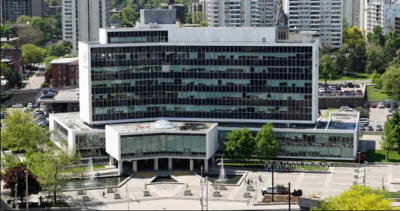 Excerpted from CATCH (Citizens at City Hall), a citizen’s report on what takes place at Hamilton’s city hall Excerpted from CATCH (Citizens at City Hall), a citizen’s report on what takes place at Hamilton’s city hall
Hamilton has submitted its concerns with the changes to the PPS – no word on what will come out of Burlington’s city hall.
Hamilton city staff are challenging yet another massive rewrite of planning rules by the provincial government. Planning staff oppose the province’s proposed elimination of policies to fight climate change and protect sensitive natural areas. They are also questioning “market based” changes that will make it easier for developers to pave over farmland and effectively shift planning approvals “from a municipal-led approach to a developer-led one.”
Municipalities are facing a major revision of the Provincial Policy Statement (PPS), the document which sets out the overriding rules that all land use planning in Ontario “must be consistent with”. The PPS directs policies on housing, infrastructure, transportation, economic development, aggregate extraction, land servicing arrangements and other municipal activities.
The province’s new rules on climate change are limited to preparing for its “potential” impacts. The Hamilton staff response going to councillors this week argues this “suggests uncertainty and does not acknowledge that impacts from climate change are already occurring”. Noting the city declaration of an emergency, they are even blunter about the provincial removal of all directions to prevent climate change.
“There are no policies within the document which speak to the importance of taking measures now to prevent or avoid climate change,” declares the staff report. “Seeing as the fight against climate change is a race against time, and actions need to be taken immediately to prevent irreversible impacts from climate change, it is an omission in the policies to not include direction to fight and prevent climate change at both the provincial and local levels through a variety of actions.”
The report also demands the province remove a new policy that “would allow mineral aggregate extraction to take place in certain natural heritage features where not previously permitted.” It further challenges wording changes that would base quarrying approvals on promises to rehabilitate in the future rather than the current requirement to review them “based on the ecological value and significance” of the affected landscape.
Other changes to the PPS centre development decisions on “market-based need” and “market demand”, terms which staff believe could “result in maintaining a market ‘status quo’ that is primarily based on a perceived desire for low density housing and will do nothing to encourage a shift to an urban form that is based on increased density.” The staff review notes that “market need and market demand are subjective terms” and asks who will define them and how that definition will be determined.
In numerous instances the word “shall” is being replaced by “should” in the PPS. Staff characterize this as policy being changed from “required” to “suggested” which gives developers more opportunity to overturn council decisions during appeals to the provincial planning tribunal.
Municipal comments on the PPS changes can be submitted until October 21.

 By Pepper Parr By Pepper Parr
October 4th, 2019
BURLINGTON, ON
It wasn’t really a debate – it was an occasion when three of the five people running for the House of Commons seat for Burlington sat beside each other and responded to questions put to them by the moderators.
Two of the five did not attend: Jane Michaels said she had a meeting conflict and the People’s Party Candidate said he had a dental appointment. Something to remember when you get to the polling stations.
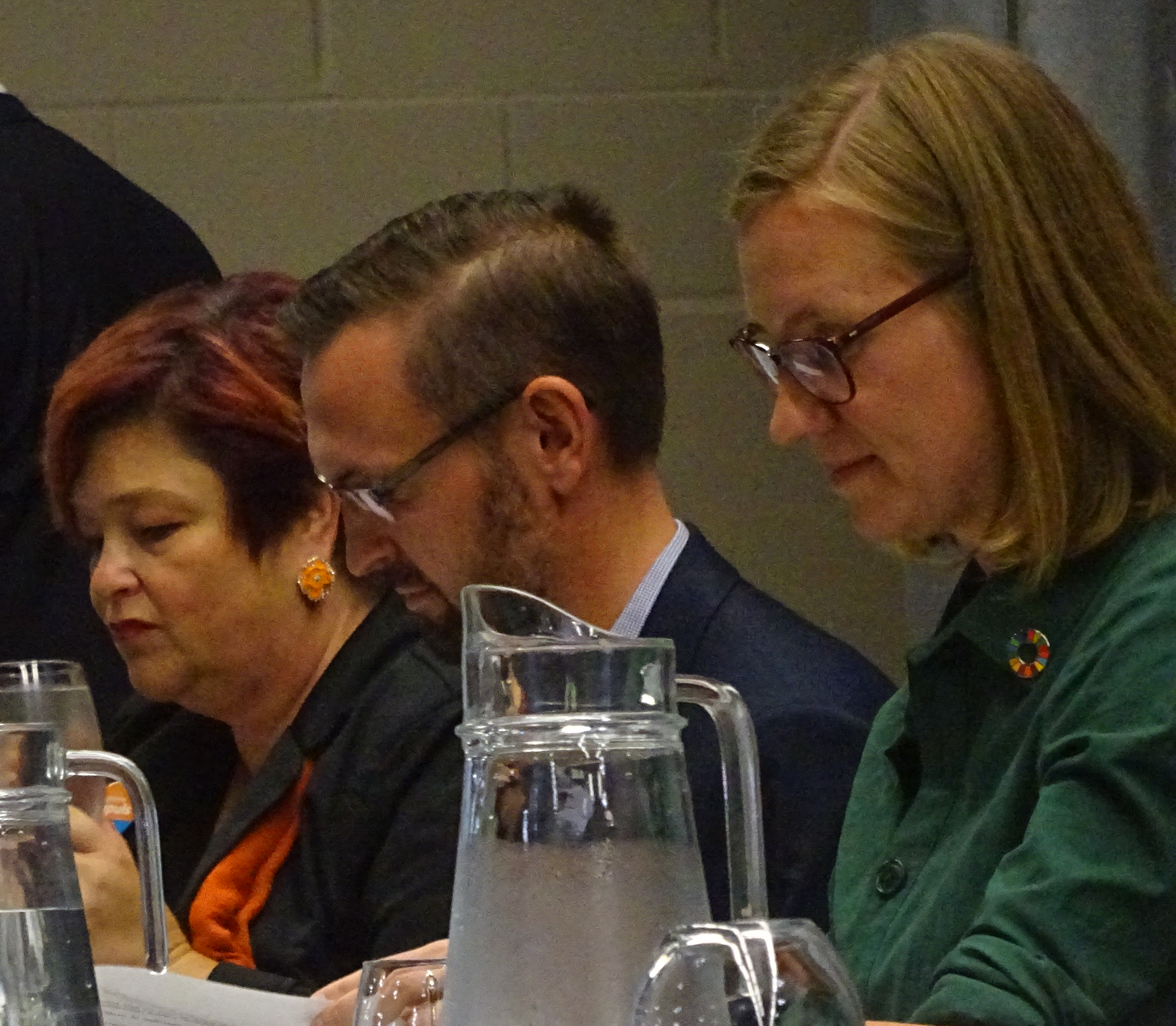 The three candidates who showed up – from the left Lenaee Dupuis, Gareth Williams and Karina Gould. Lenaee Dupuis spoke for the New Democrats, Gareth Williams for the Green Party and Karina Gould for the Liberals; Gould is seeking re-election.
There was really just the one issue – climate change. Everything else was somehow related to the climate.
Throughout the event each candidate threw out numbers: $15 million here; another $150 million there; 300,000 jobs or 50,000 housing units.
It was all in their party platforms which you could find on line.
Fast forward to the end of the debate – Karina Gould spoke of the empty seat that was set up for the Conservative party candidate Jane Michaels, and said a vote for the Conservatives was a vote for an empty seat in the House of Commons.
 Lenaee Dupuis, candidate for the New Democrats. Lenaee Dupuis was pleasant enough and had a decent grip on the issues – electable – probably not.
Gareth Williams has the wind in his sails but he is going to have to loosen up and come across as approachable.
He was a little bit better at this election than he was during the municipal election.
Williams knows his stuff – he has been active in the community for well over a decade and was one of the first people in Burlington to put solar panels on the roof of his house.
Up until this election Williams has been a Liberal. He lost faith in the party and doesn’t believe they are the answer to the climate change tsunami that is coming our way. He said he could not accept the way the Liberals failed to deliver on their promises.
There were mentions of the affordable housing issue, very little about the growing number of seniors in the community and how that was going to be dealt with.
There was mention of the need to deliver more in the way of gas taxes to the municipal sector.
Gould had the facts and figures down pat – she delivered very well.
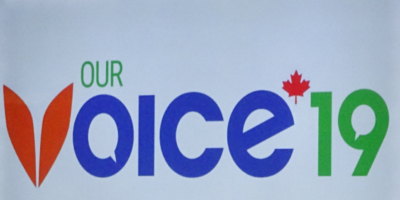 Burlington Green creating space and opportunity for the public to hear what candidates had to say. The event was sponsored by Voice 19 – the name BurlingtonGreen gave their election coverage.
The event was held at NuvoOne, the former location of the 100 Huntley Street television series. The building is undergoing a major refit. It currently has 80 different organizations with 300 people using some of the space. It is one of those buildings you can easily get lost in.
The NuvoOne concept has huge potential – the refit, based on the plans will be very attractive.
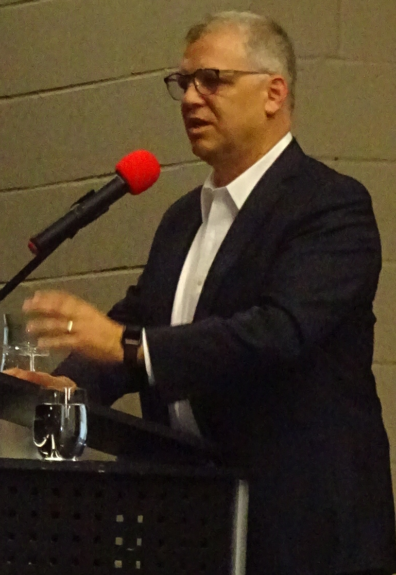 Sean Saulnier, owner of NuvoOne – location of the Burlington Green election debate. Sean Saulnier, owner of NuvoOne, donated the space for the event and then put on a small buffet and a cash bar. It has been some time since this city has seen a commercial organization put on free food.
The environment was the issue – with climate change as the focal point.
Williams was close to strident on the need to make changes now – not in a couple of months – but now.
“This is not a choice” he said –“ this is an imperative.”
Gould cautioned the audience to be realistic – she pointed out that “the kids get it” and added that they don’t see much in the way of solutions. She mentioned a student she talked to at a high school event. He told her that all he was hearing was how bad it was going to be and that was scaring him – he didn’t know what he could do – and he didn’t see a very bright future.
Gould said “We need plans people can participate in. This is the biggest challenge we have ever had to face and many of the young people don’t know what they can do.” The kid in the high school reflected the views of a lot of people. While they “get it” they aren’t being given much in the way of tools to make the difference.
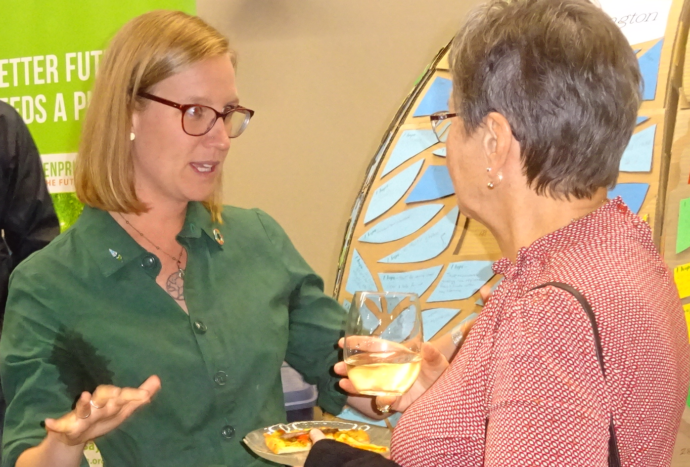 Karina Gould, the incumbent in the 2019 federal election talking with a voter at the BurlingtonGreen debate last night. They can go on marches, take part in protest and hold up smartly written signs. Gould was suggesting we had to give them more. “If people think they are losing they won’t be with us. We need to prepare people for the transition to a different economy. A “just transition” was the way Gould put it.
Williams wanted to see the billions in subsidies to the fossil fuel directed to writing off the billions in student debt.
Gould pointed to the funding being done now to re-train workers in the automotive sector and the oil and gas sector to work in the environmental sector where answers have to be found for some very complex issues.
Gould pointed out that people are not opposed to doing something about climate change but they are not all that keen on paying for those changes.
In the automotive sector there are far more pick-up trucks being sold than electric vehicles – the message has not gotten through.
All three candidates took shots at the Harper government and the changes he made that are seen now as retrograde. Andrew Sheer, the Conservative party leader was seen as a smaller version of Harper. Neither Sheer nor the Prime Minster was the issue. The issue was who can get a handle on the problem we are facing. That dilemma is reflected in the polls – the two traditional parties are in one of those neck and neck ties.
The questions put to the candidates came from different sources. The first was the only question the candidates saw in advance. The rest came from youth groups, the 300 people who worked at NuvoOne, were asked for their input – the uptake was pretty poor. This is the cohort that is supposed to be coming up with all the new technology to solve our problems. They didn’t put anything on the table at the debate last night.
There were some prepared questions from the audience but there were no direct questions from the floor.
Two statements pointed up some of the difference between Gareth Williams and Lenaee Dupuis. Gareth said “you cannot negotiate with physics and science. Dupuis said she wanted to “make life better for everyone”
Gould closed with: “We can do this, we can make people feel they are part of the solution.” Williams saw this as an “all hands on deck” situation.
The audience was polite, courteous and appreciative – this is Burlington,
What was missing was any of the candidate resonating with the audience. There wasn’t a really stunning comment or a well worded retort.
Gould was good, Williams knew his stuff and Dupuis was wearing orange.
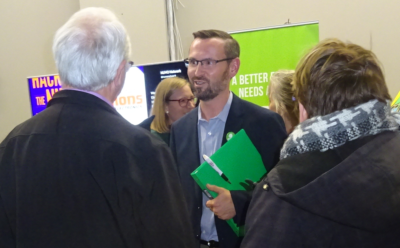 Centre Gareth Williams made one of the strongest statements – but he never managed to grab and hold the audience. What the audience didn’t get to see was any one-on-one between the candidates. At some point one of the organizations sponsoring these events will grow up and treat the audience like adults and make the candidate truly on-the-spot accountable.
Dupuis could have asked Gold and Williams a direct question. The other two, Williams and Gould would be given the same opportunity.
There were no sparks – but Williams did make an irrefutable point – there is no negotiating with physics or science.

 By Staff By Staff
October 4th, 2019
BURLINGTON, ON
It took a lot of time and effort and some dogged follow up work – but it paid off in several ways.
 The distinctive marking on the knapsack were a major clue. The police were able to arrest and charge two men with Willfully Promoting Hate and at the same time make it very clear to the public that this kind of behaviour will not be tolerated.
Investigators from the 3 District Criminal Investigations Bureau conducted an extensive and complex investigation between June and August of 2019. This case was solved through a tremendous amount of teamwork and collaboration with both internal investigative resources and external / community participation.
The HRPS would also like to thank local and national media outlets, the City of Burlington and local faith groups for bringing attention to this disturbing crime. As a result, community partners and citizens of Burlington provided access to security footage that assisted the HRPS in identifying the accused.
The remaining hate crime incidents are still under investigation and additional charges are pending. Anyone with information about any of these incidents is asked to contact investigator Detective Jared McLeod at 905-825-4777 ext. 2385 or ext. 2316.
 Suspects who left signs at city hall – walking away from cameras with poor quality lenses. The Halton Regional Police Service (HRPS) has made two arrests after investigating into several hate-motivated incidents that occurred in the City of Burlington in May and June 2019. The results of the investigation have provided grounds to lay charges in two of these incidents which took place between June 1 and 2, 2019 at Burlington City Hall and the Burlington Art Gallery and involved both Anti-Semitic and racist content.
Upon identification of both suspects, the HRPS sought approval by the Attorney General’s Office to lay a charge of “Willfully Promoting Hate”, as required by the Criminal Code of Canada. Approval to proceed with charges was granted on September 20, 2019.
On October 4, 2019, two males were arrested, charged and released for the below offences. Both accused are scheduled to appear on October 30, 2019, in the Milton Provincial Court at 9:00 AM.
Charged:
Matthew Wasikiewicz (21) of Burlington
• Willfully Promoting Hate x 2
Kyle Kroeplin (22) of Burlington
• Willfully Promoting Hate x 2
The Halton Regional Police Service is unwavering in its commitment to solve crime and bring those responsible to justice, particularly crimes that are hate-motivated. “There is no place in any community for hate. Perpetrators of crimes in Halton Region that target others because of their skin colour, race, religion, ethnic origin or any other factor will be rigorously pursued and brought to justice. Everyone in our community has the right to live, work and play in an environment free from fear,” says Chief Stephen Tanner.
 Halton Regional Police Service is unwavering in its commitment to solve crime and bring those responsible to justice, particularly crimes that are hate-motivated. Anyone with information about any of these incidents is asked to contact investigator Detective Jared McLeod at 905-825-4777 ext. 2385 or ext. 2316.
Tips can also be submitted to Crime Stoppers “See Something? Hear Something? Know Something? Contact Crime Stoppers” at 1-800-222-8477 (TIPS) or through the web at www.haltoncrimestoppers.ca.
Related news stories:
Police looking for suspects.
Days later the police had picture of a person they wanted to interview.
Police press on looking for more information – detective work at its best.

 By Staff By Staff
October 1, 2019
BURLINGTON, ON
It won’t begin until after Halloween has come and gone – the details of the 2020 budget, while not cast in stone, are basically worked out by Staff.
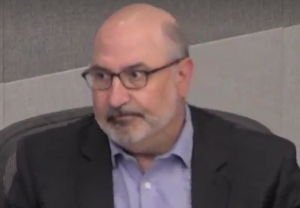 City manager Tim Commisso does not have much of an appetite for raiding the reserve funds. Councillor Sharman shares that view. Some changes take place – but not all that much – unless, like last year, funds were pulled out of various reserve funds.
Proposed meeting dates for the 2020 budget include:
Nov. 4, 2019
Meeting of Committee of the Whole: Budget overview report
Nov. 19, 2019
2020 Budget Telephone Town Hall
Dec. 10 and 12, 2019
Meeting of Committee of the Whole: Budget review and approval
Dec. 16, 2019
Meeting of Burlington City Council: City Council to consider approval of proposed 2020 budget.
For a city that has a department working on how they are going to engage the citizens – holding a Town Hall meeting is the equivalent to the cake the French nobility fed its citizens.
Previous councils held public meetings that were exceptionally well attended – not all but more than several.
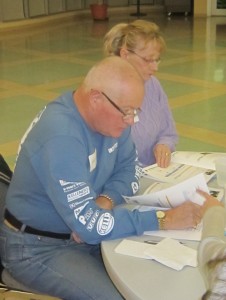 Burlington has always had a small group of citizens who get out to public meetings to review budgets, policy proposals and share ideas.  On a number of occasions the meeting hall has been packed. Proper preparation and a genuine commitment to engage does produce results. During the settling of the budget last year city manager Tim Commisso said that he wanted to do some work on putting the various reserve funds into groups rather than literally scores of them being listed. Some reserve funds are mandatory while others sit there with no clear purpose. There is certainly an opportunity to do some tidying up at that level.
No word on when the city manager is going to let everyone in on what he has managed to get done.

 By Ray Rivers By Ray Rivers
October 3rd, 2019
BURLINGTON, ON
The Bloc leader, Yves-François Blanchet, was in good form, making his points as the leader of the resurgent Quebec federal, but separatist, party. It has to be an appealing option for Quebecers – a political party dedicated solely to protecting their interests in Parliament. And their end goal is ‘Quebexit’ (Quebec exit). After all, as Mr. Scheer pointed out, thanks to Mr. Harper Quebec already can claim ‘nation’ status.
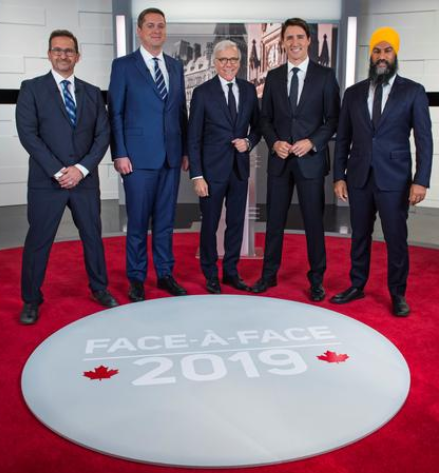 Five candidates took part in a French language debate: Yves-François Blanchet, for the BLOC Quebec, Andrew Sheer for the Conservatives, journalist Pierre Bruneau, Justin Trudeau for the Liberals and Jagmeet Singh for the New Democrats. Justin Trudeau was reserved, calm and collected even when when he was bombarded by personal attacks and cut off in mid-sentence by both Singh and Scheer. He chose to patiently bide his time even if it did reduce his speaking time. And he chose to ignore cheap shots by Sheer over costumes, his passion for canoeing or about about having two planes, which he also used during the 2015 election. Indeed, unlike Scheer, he did buy emission credits for his travel.
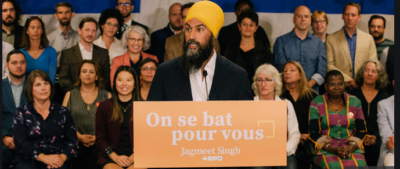 Jagmeet Singh with some of his supporters. Jagmeet Singh spoke well, at least until he started into his well-worn rant about the rich and poor. In the process he took personal shots at Trudeau, calling him rich. In fact Justin inherited a little over a million dollars when his father died – about the value of a nice bungalow in Toronto. And it’s not as if Singh, a lawyer, was ever poor. His father, a successful psychiatrist, put him through a private American high school which charges US $31,260 annual tuition. He is known to wear tailor-made expensive suits, owns a couple of Rolex watches and chooses to ride a high end bicycle.
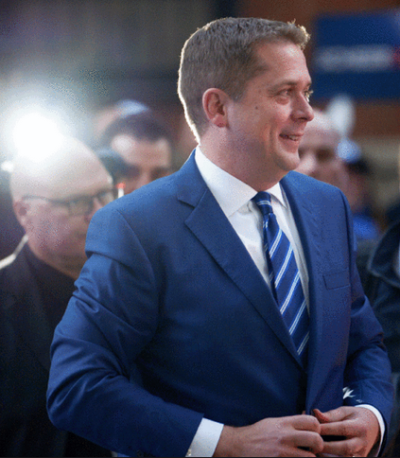 Andrew Scheer, leader of the Conservative Party. Almost every time Trudeau was given the podium, Andrew Scheer would butt in to interrupt him in broken French. And it was painful watching Scheer stumble with a language he never will be able to speak fluently. While Scheer’s French comprehension seemed pretty good, his ability to express himself was abysmal. For someone who grew up in mostly bilingual Ottawa, attended French immersion classes, and would have had free language training as an MP, that is inexcusable.
Scheer has been a federal MP for 15 years, since 2004, and House speaker from 2011 till 2015. Watching him stumble on the podium was embarrassing for everyone. Finally Mr. Blanchet helped him out by translating his so-called win-win strategy as just an ‘oil pipeline’. And even Singh got frustrated as Scheer fumbled trying to translate the Anglicism win-win into French.
But language aside it was what he was saying that differentiated him from the other candidates/party leaders. When Trudeau asked him directly, he refused to endorse a woman’s right to choose. Though the next day he said he is pro-life, what ever that means. We are all pro-life, but he is anti-choice.
His climate change dream plan amounts to a bunch of hypothetical schemes and a recycled home energy retro-fit program. And his plan to cancel the carbon tax seemed so out of context, especially given his refusal to acknowledge the carbon tax-rebate. Scheer re-iterated the false-hood that a carbon tax doesn’t work.
But where he really ran into trouble was his big win-win job creation project – an oil pipeline across Quebec. That is never going to fly in today’s Quebec. They understand that the gasoline car is on the way out, to be replaced by the EV In fact, if Scheer had checked he would have found out that Quebecers buy more EV’s per capita than folks anywhere else in the country.
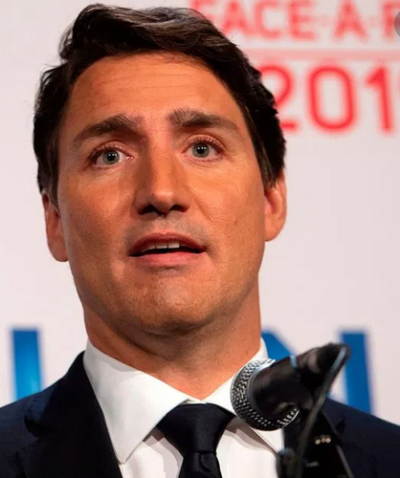 Prime Minister Justin Trudeau seeking a second term of office. Inevitably Trudeau was also challenged for his government’s apparent hypocrisy in purchasing the TMX pipeline and his plans to more than double capacity. Perhaps explaining that he was using federal money to protect Alberta’s oil industry would have been unwise, given where he was speaking? Instead he defended the purchase on the basis that profits from the pipeline will be dedicated to fund national renewable energy projects.
TVA, the French language network hosting the debate, has broad coverage through out Quebec, particularly in the area outside of Montreal. This is territory traditionally friendly to the Conservatives. So it was important for the Tories to hang onto their ridings here. But this was also an opportunity for the Bloc, NDP and Liberals to try to take some of these ridings away.
And the truth is that Mr.Scheer had a really bad night. It was the toxic combination of what he said as well as how he said it. Scheer’s main platform is about a national energy corridor which includes an oil pipeline. There is no social acceptability for that kind of initiative in this province. Quebecers care deeply about climate change and the environment so the last thing they want is another oil pipeline.
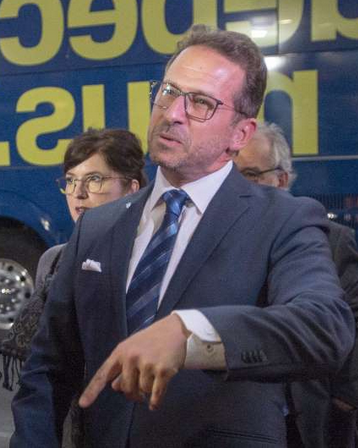 Yves-François Blanchet, leader of the BLOC. was clearly the winner There is another French language debate, so one shouldn’t count Mr. Scheer out of the race just yet. Berlitz can work miracles they say. But, language aside, he has his work cut out on policy development if he wants to inch his way into the hearts of Quebecers.
Blanchet was clearly a winner and Trudeau held his own. Singh performed well, but it remains to be seen whether Quebecers will opt for retaining the remaining NDP seats in the face of a mostly like-minded Bloc that is committed solely to their provincial interests. And for a land which recently enacted a law outlawing public servants wearing religious symbols, Mr. Singh has a huge uphill climb to convince them that he should be the top public servant of the country.
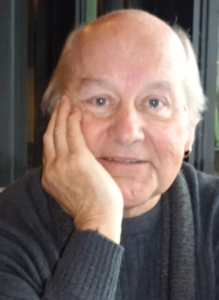 Ray Rivers writes regularly on both federal and provincial politics, applying his more than 25 years as a federal bureaucrat to his thinking. Rivers was once a candidate for provincial office in Burlington. He was the founder of the Burlington citizen committee on sustainability at a time when climate warming was a hotly debated subject. Ray has a post graduate degree in economics that he earned at the University of Ottawa. Tweet @rayzrivers Ray Rivers writes regularly on both federal and provincial politics, applying his more than 25 years as a federal bureaucrat to his thinking. Rivers was once a candidate for provincial office in Burlington. He was the founder of the Burlington citizen committee on sustainability at a time when climate warming was a hotly debated subject. Ray has a post graduate degree in economics that he earned at the University of Ottawa. Tweet @rayzrivers
Background links
Sheer Face to Face
BC Carbon Tax – Liberal Planes – Singh and Wealth – Scheer Anti-Choice –

 By Staff By Staff
October 3rd, 2019
BURLINGTON, ON
The Halton District School Board’s Parent Involvement Committee (PIC) will be hosting the 12th Annual Parent Involvement Committee Conference on Saturday, Oct. 19, 2019 from 8 a.m. – 2 p.m. at Garth Webb Secondary School (2820 Westoak Trails Blvd, Oakville).
The theme of the conference is, ‘Envisioning Possibilities: How innovation inspires students to learn, grow & succeed’.
Registration is now open.
 Nora Young, technology journalist and host of CBC Radio program “Spark” This year’s conference features Nora Young, technology journalist and host of CBC Radio program “Spark”, as the first keynote speaker. She will speak about “Seeing the Forest and the Trees: Surviving and Thriving in the Coming Data Boom”.
The ‘Data Boom’ is a new era in information that requires balancing the increasing use of digital devices and privacy protection.
 The amount of data that is now available and the amount of data that will be available has the potential to drown out much of the content. Learning how to manage the flow is a major social challenge. Members of the HDSB’s, The SHIFT, will be the second keynote speaker. Led by HDSB Superintendent Jacqueline Newton, the team’s presentation will address the topic: ‘Top Ten Lessons from a Year of Innovating (Dangerously)’.
Attendees will hear about some of the lessons the Halton District School Board has learned about evolving teaching approaches and how parents/guardians can support and inspire children to become innovators in school.
The 2019 PIC Conference will provide engaging workshops that address topics such as Building Healthy Relationships, The Gifted Learner, Tech Help, Making Financial Decisions, the HDSB I-STEM Program, Equity & Inclusion in the Classroom, Vaping and Cannabis and TVO Mathify.
“The Halton District School Board’s Parent Involvement Committee welcomes parents, guardians and community members to join us for a great conference, filled with outstanding speakers and curated content,” says John Pennyfather, Superintendent of Education for the Halton District School Board. “This annual conference is designed to recognize the important role parents play in the development of their children and in their success throughout their school experience.”

 By Staff By Staff
October 3rd, 2019
BURLINGTON, ON
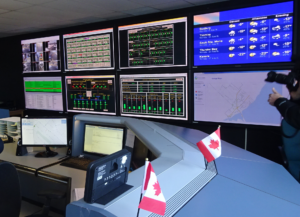 Hydro operations control room. This is where the service information is gathered. It has been a bit of a tough time for people in the downtown core, especially east of Brant. Power has been off for up to seven hours for some people.
At 6:45 am here were 49 people without power according to the Burlington Hydro web site.
 Red hat identifies unplanned outage area. No specific boundary area detail was available. The cause of the outage was described as “weather”
The Gazette will touch base with Hydro when media staff there show up for work and look for a more detailed explanation.

 By Staff By Staff
October 2, 2019
BURLINGTON, ON
On August 19, 2019, the Amica people along with their financial partner Bruce Partners submitted a revised development proposal which includes 17-storey and 12-storey building elements with a 6-storey lower building podium, transitioning down to a 2-storey element for a portion of the rear of the building. The number of proposed senior’s living units has been decreased from 475 to 419.
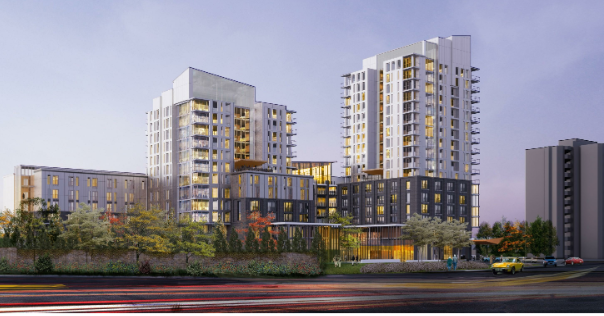 The development is at the intersection of North Shore Blvd and the ramp to the 403. Then on September 23, 2019, the Official Plan amendment and Zoning By-law amendment applications to facilitate the proposed development were appealed to the Local Planning Appeals Tribunal (LPAT).
Amica appealed the applications based upon the lack of a City decision on these applications within the legislated timeframes, as set out by The Planning Act.
The site is within the City’s Interim Control By-law area, and as such, no recommendation reports have been brought forward for development applications in this area until such time as the Interim Control By-law is lifted and policy and zoning are in place.
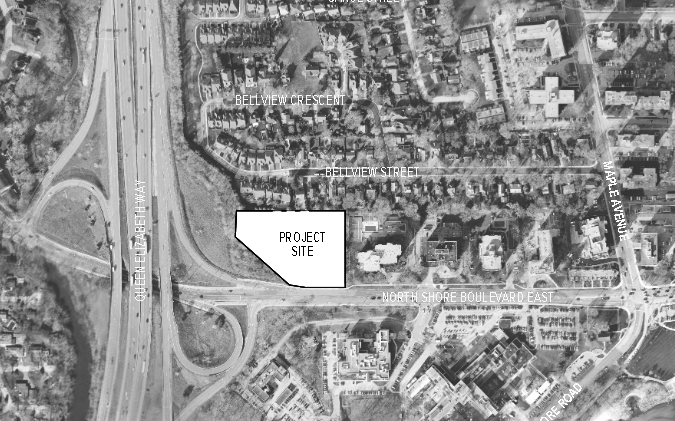 Where the development is to be located. 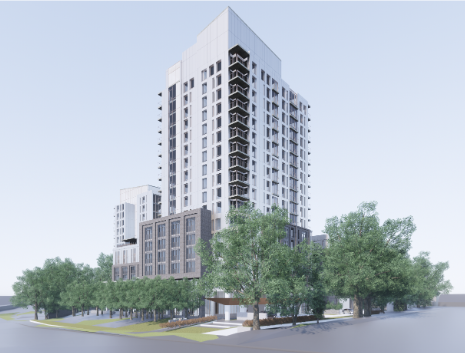 A rendering of the view of the development from the south east corner. 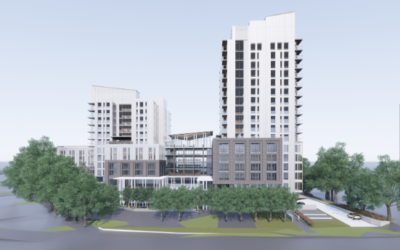 The elevation from the south. One Burlington resident is concerned that the automatic appeal that arises from the city’s lack of decision is really just a fait accompli for the development.
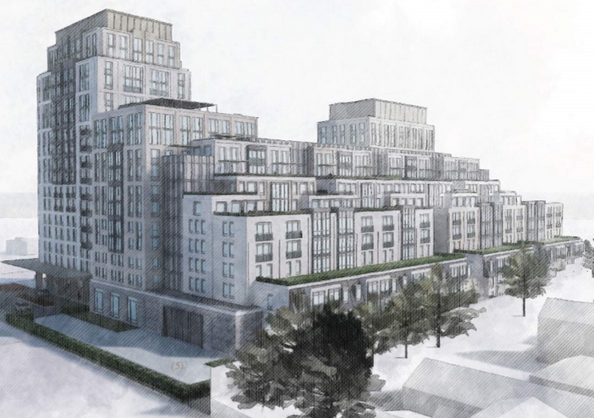 An early rendering of what the site would have looked like to the people on the adjacent street. “It will eventually pass because LPAT has jurisdiction and the city’s interim bylaw to halt development is nothing but an illusion of trying to do the right thing. If the city does nothing more than not make a decision, they are allowing developers to proceed in absentia.
The only plus in all that at this point is the revised plan is not as brutal to the eye as the first one.
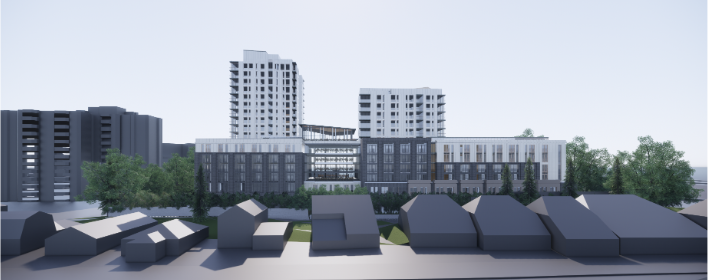 The revised elevation in the latest version of the Amica development. 
 By Staff By Staff
October 2, 2019
BURLINGTON, ON
ECoB – the grass roots organization that gave Burlington the best look at the candidates in the municipal election has come up with an interesting approach to giving the public a look at what the federal election candidates have to say.
 ECoB, formed in 2017 , are the Engaged Citizens of Burlington. They have a small group in every ward in the city with a membership of 600 people. Anyone can become a member. ECoB, formed in 2017 , are the Engaged Citizens of Burlington. They have a small group in every ward in the city with a membership of 600 people. Anyone can become a member.
Producing videos like this takes hundreds of volunteer hours and needs money too. If you like what ECoB is doing, please consider donating to ECoB and becoming a paid member (it’s just $10 a year).
The organization is doing two minute videos of the candidates, well at least those that accept the offer to take part.
So far there has been one video each from the New Democrats, the Liberals and the Greens.
The idea was to produce short videos on the one subject. The same question is put to every candidate. The location is always the same at the Burlington Baptist Church on New Street.
Jennifer Olchowy, a member of the ECoB executive reads a prepared introduction about the candidate, introduces the candidate who then speaks for one minute.
The best way to appreciate and understand what ECoB is doing is to watch the videos.
The Gazette will be publishing everything produce and will archive the material as well.
October 1st
Liberal candidate Karina Gould
Green Candidate Gareth Williams
New Democrat Lenaee Dupuis
The Conservative candidate declined to take part.
ECoB did not hear from the Peoples Party of Canada candidate.

 By Staff By Staff
October 16th, 2019
BURLINGTON, ON
Complaints regarding the odour emitting from the plant at Harvester and Appleby had City staff and Council reaching out to Sofina Foods as well as the Ministry of Environment, Conservation and Parks to find a resolution to this issue.
 A 150 year old corporation that plays a significant role in the Burlington economy. Should a slaughterhouse be in this location? Sofina Foods continues to investigate the origins of the odour and has been working with the Ministry of Environment, Conservation and Parks.
Today, the Ministry of Environment, Conservation and Parks staff informed the City that on October 11, 2019, a ministry order was issued to Sofina Foods:
“The order requires the company to remove waste sludge from the property within three hours of filling a tanker trailer. We believe this is action that can be taken quickly to improve odours from the site.
The ministry has been responding to a large number of complaints about odours from the facility. Ministry staff have been to the property on several occasions to look into the sources of odours and to discuss actions the company is taking to control odours.
The order is an immediate measure to deal with one source of odours from the site. There are other sources of odours at the property, and the company has hired a consulting firm to assess sources of odours at the site. The ministry will continue to monitor the company’s actions and require it to identify and address its sources of odours.”
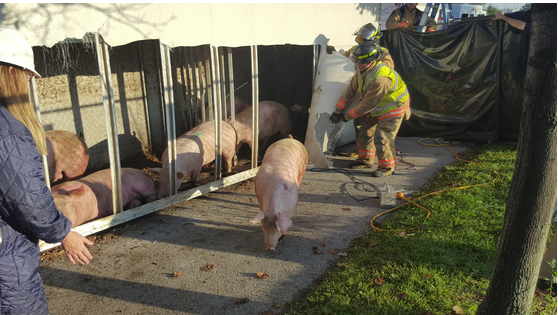 In 2016 a tractor trailer flipped as it was about to enter the slaughterhouse – pigs were running everywhere for more than an hour. Residents are encouraged to report any odour near the area immediately to Sofina Foods at (289) 834-3543, reporting the time and location of the odour directly to Sofina will assist their investigation.
The Ministry of Environment, Conservation and Parks will also continue to respond to complaints about odours, residents may also report odour problems as soon as possible to the ministry by calling the ministry’s Spills Action Centre at 1-800-268-6060, which is open 24 hours per day, 7 days per week.
Although the City of Burlington has no jurisdiction in the case of Sofina’s operations, members of Council and staff, including the Ward Councillor Paul Sharman, continue to be engaged in finding the cause of the odour and a speedy resolution.
That’s the city’s side of the story.
It took the Ministry how many days to tell the city they has issued an order? From the 11th to the 15th would make that four days.
That is a long time to hold your nose.
Sofina Foods operates the Fearman Pork operation in the east end. Why didin’t the city use the name most people recognize?
No word from the Mayor’s office – this is a big stink issue.
That factory shares the environment with a larger community. They know what the rules off and they should have done something immediately.
No excuse for this behaviour.

 By Staff By Staff
October 1st, 2019
BURLINGTON, ON
In the weeks ahead city council will begin crafting the budget for the 2020 year. It will be the second budget this team has done – but this time around they have a much better grip on just what they are spending and where the money is coming from.
Mayor Meed Ward and Councillor Sharman were the only two members of council who, at the time, had a full understanding of what putting together a municipal budget meant. It was a steep learning curve for the five new members of Council.
In 2018 the Mayor was determined to bring in a budget under a 3% increase. Councillor Sharman wanted to ensure that there was some money left in the reserve funds.
The budget increase was kept under 3%
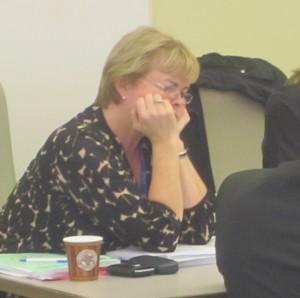 Director of Finance, Joan Ford At the city council meeting last week the Director of Finance, Joan Ford, brought people up to date on where things stood at the end of June. Most people who work on budget refer to having either a surplus or a deficit – the municipal world talks in terms of variances from what they budgeted as either favourable or unfavourable.
Set out below is the position at the end of June. Any surplus (oops favourable variance) doesn’t get returned to the citizens. It gets spread around and into reserve funds and anything they don’t know what to do with gets dropped into the tax stabilization fund. At least that was the practice from 2010 to 2018.
Mayor Meed Ward is going to break a lot of the rules as she works to refashion the way city hall operates. Having a council that is more informed on financial matters it should be interesting to see what they decide to do with one of those favorable variances.
They decided to:
Direct the Director of Finance to report back on the city’s retained savings strategy upon confirmation of the 2019 year-end actual.
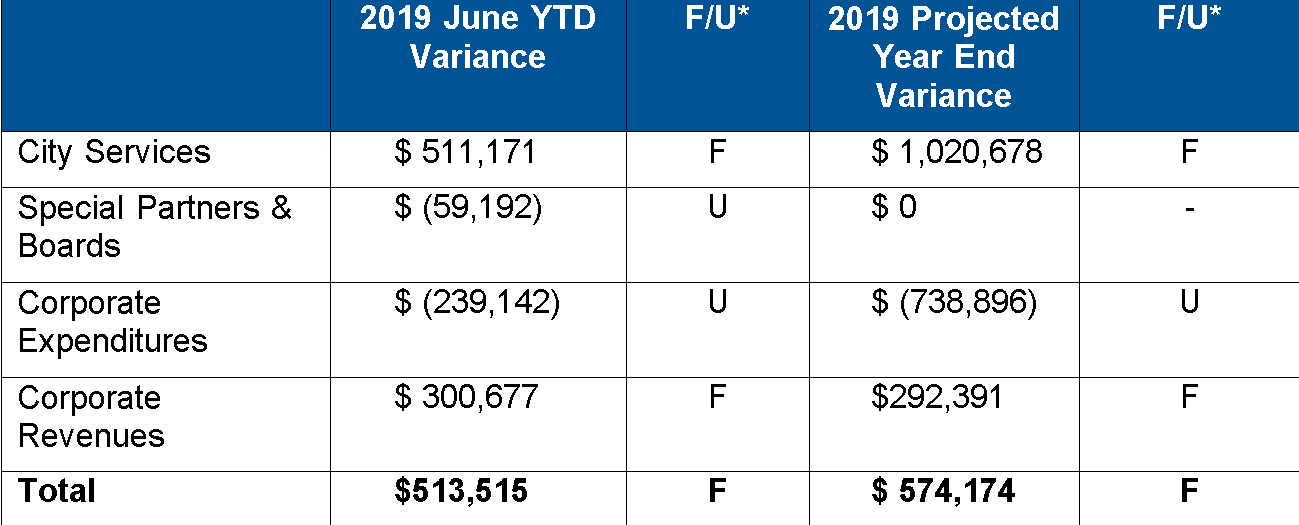 If the variance holds at $574,174 it will cover the $503,000 that got scooped from the city’s bank account. Year-end projections will be refined by staff in order to improve their degree of precision. Services will also continue to exercise due diligence when authorizing large expenditures.
Any savings are viewed as “one-time” revenue. From a multi-year budgeting perspective, the use of “one-time” revenues should be tied directly to “one-time expenditure priorities that may include transfers to reserve funds. To do otherwise results in the reliance on “one-time” revenues for funding ongoing expenditures and is contrary to multi-year budgeting principles.
Staff will report to Council in the New Year with a specific recommendation once the year end savings are quantified. Staff continue to recommend contributions to Reserve and Reserve Funds to allow the city the financial flexibility to respond to uncontrollable factors (such as economic cycles, revenue fluctuations, and severe weather events plus short term and one-time needs, and sustainability to plan for today and the future.
 The monitoring of corporate and service expenditures and revenues is part of the Operating Budget Performance policy which exists as a key component of the City’s financial management control system. The monitoring of corporate and service expenditures and revenues is part of the Operating Budget Performance policy which exists as a key component of the City’s financial management control system.
It will be interesting to see how the Finance department handles that $503,000 that slipped out of an account and is never likely to return.

 By Ashley Worobec By Ashley Worobec
October 1st, 2019
BURLINGTON, ON
After the heat and humidity of last Sunday’s long run, I welcomed the 14C at the start of this Sunday’s run.
 The 36km on my schedule I had 36km on my schedule, which is the longest run I’ve done since my last marathon in 2007. I was daunted, but hung in there with my training partners and we saw all of Oakville and most of Mississauga! Ha!
Most of our route was flat, along the lakeshore and surrounding areas, and I am really proud of this run.
I felt great, which gives me confidence in my training and my abilities, and I’m ready for next weekend’s “recovery week”, which has our long run capping out at 16km.
 The dog sets the pace. It’s amazing to me what our bodies can be trained to do – 16km is going to feel like a very short run to me, whereas only a few months ago it felt long. Perspective. We now have this recovery week, and then one more huge run (38km) on Thanksgiving Sunday, before we begin our 3-week taper.
A taper is a period of time where you focus on rest and recovery to allow your body to show up to the start line feeling strong and ready rather than depleted and tired. By that point, “the hay is in the barn,” as my former coach used to say, and you just need to reap the benefits of recovery and not overdo it; training gains are accomplished a few weeks after the actual training, so in theory, my fitness will peak on November 3rd for race day.
 Bulldog puppies yoga – a little easier than goat yoga. After my run, my family participated in a really unique event – puppy yoga! A local yoga instructor teamed up with a local breeder of bulldog puppies and they put on a yoga class while the little pups wandered about for snuggles.
My kids loved the puppies, and I loved the recovery aspect and the bonus of some puppy time. I feel great today, and that shows me that I need to make yoga/mobility more of a focus on Sunday afternoons following these long runs.
I’ve also been getting out a lot lately with our dog- a nice dog walk after a run helps to flush my legs and speed recovery (do you see a pattern here?) and of course gives me a huge mental boost; Fall is my favourite season.
Ashley Worobec is a chiropractor who specializes in sports medicine. A former Boston marathoner, Dr. Worobec often runs the Chilly Half marathon and Around the Bay 30K. She has lived in Burlington for ten years with her husband and their two children. She qualified to run in the New York City Marathon in November.

 By Ray Rivers By Ray Rivers
October 1st, 2019
BURLINGTON, ON
The latest polls are telling us that unless things change we are heading for a minority situation after the polls close election day, with neither major party winning the magic number of 170 seats.
And that will almost certainly leave either the Liberals or the Conservatives looking for support among the smaller parties.
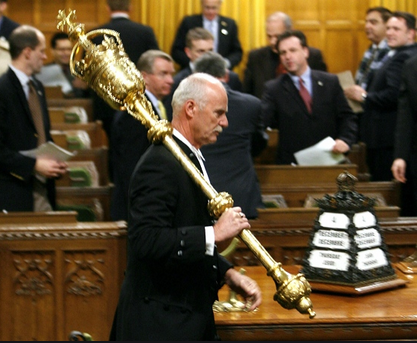 The Sergeant at Arms carries the Mace out of the House of Commons signifying that it is no longer in session. The options include a formalized coalition as the Liberals, NDP and Bloc had proposed back in December 2008. At that time the opposition parties were upset that the governing minority Tories didn’t have a fiscal plan to protect Canadians from the evolving global recession. Facing an imminent non-confidence motion Harper convinced the governor general to prorogue Parliament.
Once Parliament resumed he over-compensated for his near blunder by running up the largest deficit in the nation’s history, much of it wasted on frill spending for the G7 meeting in Toronto. With that, the coalition dissolved and Harper dutifully paid closer attention to opposition demands, at least until he won a majority in 2011.
The legal community was divided about the legitimacy of shutting down parliament in the face of a non-confidence vote just to avoid Harper’s almost certain defeat. British PM Boris Johnson recently tried to use the same tactic to shut down the British Parliament. In this case though, the British Supreme Court unanimously overturned his prorogation, citing that it was an affront to democracy.
After an election the party with the most seats can claim the right to form government, even without a formal coalition. Lester Pearson is seen by many as one of our best PMs though he never had the luxury of a majority of seats, nor a formal arrangement with any of the opposition. Notably he delivered universal health care and the Canadian flag. His approach was to find common ground on matters of policy in order to avoid losing the confidence of the house.
Pierre Trudeau and Stephen Harper for the most part followed that leadership model. Joe Clark, on the other hand, was inflexible and uncompromising, which accounted for his relatively short time in office. He was defeated on a budget in the House, and ultimately by the Canadian voters at the ensuing election.
 Pipelines are dear to his heart. Andrew Scheer’s Conservatives are currently leading in some polls, so the question is what happens if they get the most seats but not enough for a majority. Some of Scheer’s main policies involve building a trans-national oil pipeline, scrapping the current environmental assessment process, cancelling the carbon tax and rolling back other climate action initiatives.
Only his former colleague and opponent for the Conservative leadership, Maxime Bernier, and his ultra-right People’s Party would be on-side with those kinds of reactionary policies. Bernier is, after all, one of the last great climate deniers. And he has positioned himself so far to the right that the only seat his party may be able to win is in western Canada, the home to so many other real dinosaurs. That is unless Rob Ford’s widow surprises us all in Etobicoke. And we should have learned never to underestimate the Ford nation.
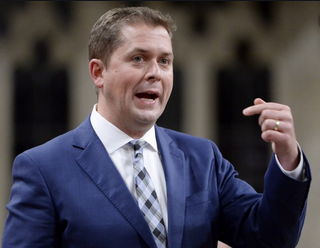 The country doesn’t know this man all hat well. This election campaign is making him much more visible to people of every political persuasion. Scheer’s recently unveiled environment plan, which he labels as the best climate action plan, has been estimated to actually increase rather than reduce emissions by 2030, Canada’s target year under the Paris climate agreement. While there is independent analysis which shows the Liberal plan is likely to miss the 2030 target, it will at least reduce emissions.
Mr. Scheer’s claim made in the same breath that he attacks Mr. Trudeau, for likely missing the target, is more than duplicitous – a case of ‘talking rather than walking’, and following the lead of Tory provincial governments in Alberta and Ontario. Mr. Ford, for example, is increasing speed limits on its multi-lane highways which will lead to increased fuel use and auto emissions of at least 10%.
 The Bloc is still a strong political force in Quebec. There is no social acceptability for an oil pipeline in Quebec, so Mr.Scheer won’t find any support among the separatist Bloc Quebecois, the provincial-only federal political party which is rising in the polls again in Quebec. Bloc policies for the most part are similar to those of the NDP, without a lot of the separatist rhetoric.
But even on separatism, it is no secret that Quebecers switched their votes en mass from the Bloc to the NDP once Jack Layton defied the Supreme Court and promised Quebecers, were he the prime minster, they could separate on a vote of 51%. And Jagmeet Singh has learned well from the master, stirring the pot with fresh foolish promises for a new federal deal and a more independent Quebec.
 Jagmeet Singh doesn’t have a lot of room for any political maneuvering. Singh, in the short time he has been leader of the NDP, has proven every bit as opportunistic as Layton was. He is talking out of both sides of his mouth on TMX and the B.C. LNG project, approved and subsidized by both the feds and the province. Still, both he and Green Party leader Elizabeth May would have a membership revolt were they to support Scheer’s plans.
 Green Party leader Elizabeth could end of holding the balance of power. And without that support Scheer would have to go it alone, hoping the Liberals would support him on some issues. But Scheer has been particularly nasty when it comes to Mr. Trudeau, even in the pre-campaign period, so if there is some support it won’t be out of love. Scheer would need to try a little tenderness when it comes to his main opponent.
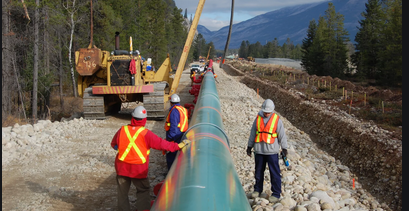 If you live in Alberta – this pipeline is the path to prosperity. One Alberta news media is pleading for a majority government by either main party, amid the fear that the TMX pipeline may be cancelled as a ransom demand by third parties in a minority government. The parties on the right can count on about a third of the all the votes, another third will likely go to the Liberals and the remainder will be held by the smaller left leaning parties.
The stronger the support for the third parties, the greater the chance that Mr. Scheer will able to slip up the middle and win a majority government, much as Ontario premier Doug Ford did last year. But the reality is that unless Andrew Scheer breaks through the 170 seat barrier he might as well trash most of his party’s platform. He will not be able to implement it in whole, nor even most of its components. Trying to do that would doom him to the fate suffered by Joe Clark – a short lived term in office followed by another election.
 Ray Rivers writes regularly on both federal and provincial politics, applying his more than 25 years as a federal bureaucrat to his thinking. Rivers was once a candidate for provincial office in Burlington. He was the founder of the Burlington citizen committee on sustainability at a time when climate warming was a hotly debated subject. Ray has a post graduate degree in economics that he earned at the University of Ottawa. Tweet @rayzrivers Ray Rivers writes regularly on both federal and provincial politics, applying his more than 25 years as a federal bureaucrat to his thinking. Rivers was once a candidate for provincial office in Burlington. He was the founder of the Burlington citizen committee on sustainability at a time when climate warming was a hotly debated subject. Ray has a post graduate degree in economics that he earned at the University of Ottawa. Tweet @rayzrivers
Background links:
Election Tipping Points – Political Coalition –
Maxime Bernier –

|
|




 Ray Rivers writes regularly on both federal and provincial politics, applying his more than 25 years as a federal bureaucrat to his thinking. Rivers was once a candidate for provincial office in Burlington. He was the founder of the Burlington citizen committee on sustainability at a time when climate warming was a hotly debated subject. Ray has a post graduate degree in economics that he earned at the University of Ottawa. Tweet @rayzrivers
Ray Rivers writes regularly on both federal and provincial politics, applying his more than 25 years as a federal bureaucrat to his thinking. Rivers was once a candidate for provincial office in Burlington. He was the founder of the Burlington citizen committee on sustainability at a time when climate warming was a hotly debated subject. Ray has a post graduate degree in economics that he earned at the University of Ottawa. Tweet @rayzrivers

























































































